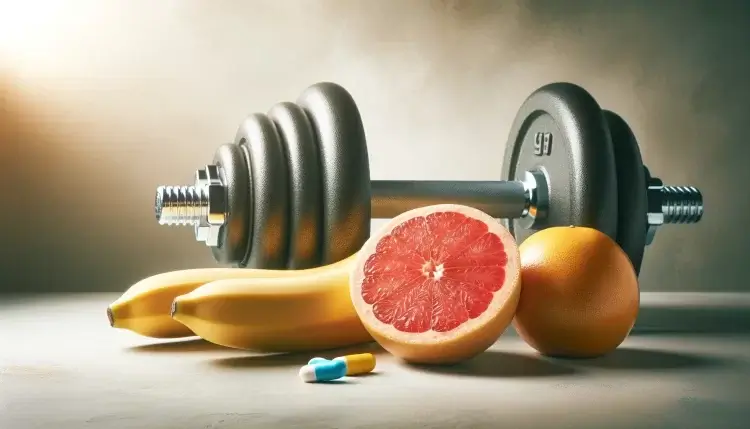
Estimated reading time: 10 minutes
Table of contents
Introduction
Men who use anabolic-androgenic steroids (AAS) are well aware of how these substances can impact their libido and sexual performance. While this topic hasn’t always been openly discussed, the anonymity of the internet has made these conversations more common. Now, the research community is starting to catch up.
A recent study by Orlanda Harvey, Margarete Parrish, Edwin van Teijlingen, and Steven Trenoweth looks into how libido acts as a key motivator for men to start and restart AAS. The research explores the interplay between libido, sexual performance, and AAS use, contributing to a deeper understanding of why men turn to steroids beyond just wanting bigger muscles.
Libido and Sex as a Motivator for Steroid Use
The main reasons men use anabolic steroids are to enhance their physical appearance and performance. But there are plenty of other reasons too.
Some guys turn to steroids for their jobs, to feel safer, to improve their mental health, or because of peer pressure. They might want to boost their confidence, attract a partner, prevent injuries, or even combat depression. Others might be influenced by the media, follow the trend as a social norm, or simply feel frustrated after hitting a muscle-building plateau.
There are some unexpected reasons too. Steroids are sometimes used to become braver, make money, increase sex drive, and lose weight.
Sexual functioning issues, particularly hypogonadism cause by long-term steroid use, are often cited as reasons to start using again. Steroids can serve as a form of self-medication for low testosterone, which has been noted to increase sex drive—a benefit that hasn’t been deeply explored.
Few studies look at how cultural meanings tied to testosterone influence men’s steroid use and the importance of libido in this context. Traditionally, the focus has been on muscle gain for competition or aesthetics. Harvey’s research team takes a fresh look at how libido acts as a key driving force for men to begin and resume steroid use.

Read About the Bodybuilders Who Participated
The researchers used a mixed-methods approach, starting with a questionnaire survey of 133 male AAS users, including a few MESO-Rx members. The questionnaire gathered information on demographics, reasons for using steroids, and their experiences.
They then followed up with in-depth interviews with 23 of these participants, aged 20 to 52. Most had at least a college or university education (20). The group included 11 from the United Kingdom, 7 from the United States, and one each from Canada, Hong Kong, Spain, Belgium, and Denmark. All but one participant were White; the exception was Hispanic. Among them, 3 were competitive bodybuilders, 3 were competitive athletes, 8 were recreational exercisers, 3 were personal trainers, and 4 described a mix of these activities.
The motivations for using anabolic androgenic steroids (AAS) are complex, with no participants citing fewer than four reasons for their use.
Out of the 128 people who shared how their lives had changed since starting anabolic steroids, 74% said their quality of life improved, 20.3% felt it stayed the same, and 5.4% thought it got worse.
Bodybuilders Discuss the Impact of Steroid Use on Libido
The study found that 90% of participants experienced a boost in libido (desire to have sex) as a “positive emotion” from using anabolic androgenic steroids (AAS). This discovery unraveled a complex web of motivations, experiences, and consequences, shedding light on the intricate relationship between AAS use and male sexual health.
The study identified four main themes:
- Increased libido as a motivation for starting or restarting AAS use.
- Experiences of enhanced libido and sexual function due to AAS.
- Mixed interactions with physicians regarding libido changes and hypogonadism.
- Negative impacts on libido, sexual function, and fertility after stopping AAS.
1. Increased Libido as a Motivator for Steroid Use:
Increased libido is a big reason why many men start or restart using anabolic steroids. For 38% of the guys in the study, the promise of a better sex drive was a major factor.
Matteo, 47, from Italy, found it impossible to stay lean and maintain a decent libido after hitting 42.
Others, like Greg, 55, turned to AAS to keep his sex drive alive, while Patrick, 56, was driven by a more primal urge to maintain his sexual vitality. “I want to die with my big cock HARD,” he bluntly stated.
For Nick, 50, the decision to stay on testosterone for life came after a failed attempt to recover naturally. “No sex for three months was a deal breaker,” he confessed.
Others had similar stories. Asi, a 28-year-old from the USA, found out his testosterone levels were borderline low after a blood test. That was all he needed to justify trying steroids to deal with his low testosterone symptoms.
Some guys didn’t start with libido in mind but were swayed by the anti-aging benefits they read about. Alvin, a 36-year-old from the UK, decided to use performance-enhancing drugs for powerlifting. He was also influenced by research on testosterone replacement therapy and its positive effects for men his age.
For many guys, the reason to restart using anabolic steroids shifts over time. What starts as a motivation for competition or cycling often turns into a need to address low testosterone, leading to a “blast and cruise” approach—using steroids continuously but changing the doses.
Take Lee, a 43-year-old from the USA. When he stopped using steroids, he felt exhausted, unattractive, and generally unwell. So, he saw a doctor and started testosterone replacement therapy (TRT), getting 120 milligrams of testosterone cypionate each week. This helped him feel better and more energetic. But when he wanted to compete or do bodybuilding, he’d add non-prescribed steroids on top of his TRT.
Lee’s motivation evolved from competing to focusing on his overall well-being. Now, he uses TRT to maintain his health and occasionally boosts his regimen with steroids for competitive events.

2. Experiences of Increased Libido and Sexual Function Due to Steroids:
Participants in the study highlighted several benefits of using anabolic androgenic steroids (AAS), with increased strength and muscle building topping the list. But an interesting side effect that many reported was a boost in libido and sexual performance. Almost half of the respondents noted improvements in their sex drive, using terms like “more stamina in bed,” “always horny,” and “rock hard erections.”
Several guys talked about how this increased libido positively affected their lives, whether they were single or in relationships. Alvin, 36, from the UK, said it improved his quality of life and his relationship.
Andrew, 25, also from the UK, described the feeling as amazing, like having the sex drive of a “Greek God.” Lewis, 37, from the USA, mentioned that his libido was “insane” while on high doses, allowing him to have sex multiple times a day.
Ray, 39, from New Zealand, managed his increased libido by having more sex with his wife and saw it as a positive. However, not everyone saw it that way. Three participants found the heightened libido to be a downside. Niall, 25, from Canada, described it as a “constant persistent distractingly high libido.”
For some, their reasons for using AAS changed over time. While they might have started for different reasons, maintaining their enhanced sex drive became a key motivation to keep using or return to AAS.
3. Experiences with Physicians Discussing Steroids and Libido:
Participants shared their experiences with doctors about libido changes and hypogonadism, and it was clear many felt frustrated.
Several guys in the US were diagnosed with low testosterone and got testosterone prescriptions from their doctors. But a lot of them felt like their doctors didn’t really get it.
Hugo, 53, found a private online clinic because he felt dismissed by traditional doctors who told him to just accept his symptoms as normal for his age.
In the UK, the frustration was similar. Colin, 21, mentioned that some doctors’ views on testosterone replacement therapy (TRT) were shocking.
Some participants who were told their testosterone levels were “normal” ended up self-medicating because they still had symptoms. Many felt that the standard medical ranges for testosterone were flawed, not accounting for age differences.
Powel, 34, wished UK doctors were more open-minded and considerate of patients’ feelings, noting that American doctors seemed more understanding. Powel shared that after being told he was fine despite having depressive symptoms, he decided to handle it himself.
Isaac, 42, suggested that testosterone ranges should be age-specific, arguing that a more tailored approach would improve treatment outcomes.
Sam, 36, strongly believed that every man should be on TRT after a certain age, under a doctor’s guidance.
4. Experiences of Negative Sexual Effects after Stopping Steroids:
The study also looked at the downsides of stopping anabolic steroid use, such as anabolic steroid induced hypogonadism (ASIH), especially how it affects libido, sexual function, and fertility. Participants shared various issues they faced, like losing their sex drive, having trouble in bed, and feeling down.
Peter, 24, from the UK, thought he’d be fine after stopping but started experiencing sexual dysfunction three months later. Amir, 21, from Greece, found his sex drive plummeted and couldn’t climax. Lawrie, 27, from the UK, said he lost interest in women and found the whole situation depressing, especially since he felt a pressure to perform sexually.
Andrew, 25, from the UK, felt overly emotional and “demasculinized” after coming off a big cycle. To cope, some guys turned to Viagra, while others switched to a “blast and cruise” approach—continuing steroids at lower doses to avoid withdrawal symptoms.
Robert, 34, from Spain, decided it was better to stay on steroids continuously rather than deal with the ups and downs of cycling. Isaac, 42, from the UK, has been using continuously since he was 37 to avoid withdrawal issues.

Summary
The study highlights the complex motivations for AAS use, which evolve over time. While muscle enhancement remains a key driver, libido and sexual performance play significant roles, particularly for older men or those with low testosterone. The findings underscore the influence of hegemonic masculinity, where virility and sexual prowess are highly valued. This cultural context shapes men’s decisions to use AAS as a means of maintaining or enhancing their masculine identity.
Implications for Healthcare Providers
Many participants distrusted doctors’ knowledge of steroids and testosterone therapy, preferring to rely on self-help and online forums. Men are less likely to seek medical help and often underreport symptoms, which pushes them towards self-medication.
Healthcare providers need to consider the psychological and social factors influencing AAS use, particularly the role of libido and sexual function. Building trust with AAS users and providing tailored support could encourage safer practices and reduce reliance on self-medication. Further research is needed on the impact of AAS use on partners and the broader social implications.
Future Research Directions
More research is needed to see how steroid use affects men’s relationships and partners. There’s also a need to explore how low mood and libido impact masculine identity. Building trust with the steroid-using community is key to encouraging healthier behaviors and better support.
Conclusion
The study shows that increased libido is a big motivator for men to start or restart steroid use. Aging and lowered testosterone levels can hit men’s self-esteem and sense of masculinity hard, pushing them to self-medicate with steroids. Healthcare providers and harm reduction services need to grasp the motivations and emotional impacts of low testosterone on men. Further investigation into the use of steroids as self-medication and its effects on libido is essential.
References
Harvey, O., Parrish, M., van Teijlingen, E., & Trenoweth, S. (2021). Libido as a motivator for starting and restarting non-prescribed anabolic androgenic steroid use among men: A mixed-methods study. Drugs: Education, Prevention and Policy, 1–13. https://doi.org/10.1080/09687637.2021.1882940
About the author
Millard writes about anabolic steroids and performance enhancing drugs and their use and impact in sport and society. He discusses the medical and non-medical uses of anabolic-androgenic steroids while advocating a harm reduction approach to steroid education.

Leave a Reply
You must be logged in to post a comment.